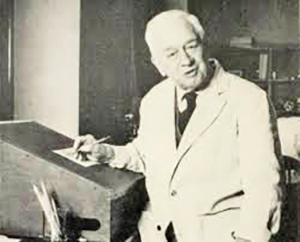
We conclude our series on Simon & Garfunkel and great New York cancer scientists/researchers with one who was perhaps the greatest of them all. He was “a Rock”—
I have my books
And my poetry to protect me
I am shielded in my armor
Hiding in my room safe within my womb.
Peyton Rous was born in 1879 in Baltimore and went to the public schools before going to Johns Hopkins University for his undergraduate and medical school degrees on a scholarship. While a second-year student, he developed a particularly severe form of tuberculosis from a finger injury during an autopsy and took a year off to recuperate. When he returned to medical school, he decided that he could not undertake regular clinical practice because of the tuberculosis, but would instead devote himself to medical research. He initially spent time doing research at the University of Michigan and then spent some time in Germany at various institutions.
Upon his return in 1908, he was told of a scholarship for cancer research at the Rockefeller Institute in New York. He began doing research there and caught the attention of Simon Flexner, the director of the institute, who subsequently offered him the position of director of cancer research.
Rous initially started studying tumors in rodents but soon switched to chickens. In particular, in 1910 a woman brought him a Plymouth Rock red hen on whose breast a large mass had developed. When he studied it, it proved to be a spindle cell tumor or sarcoma. The tumor produced an exudate (a fluid that leaks out of a mass or other part of the body). He soon realized that, with this exudate, he could induce a new tumor in a healthy hen. However, the chicken had to be of the same breed, so he recognized that genetic relatedness was necessary. When he published this finding, it was the first report of a transplantable avian tumor, but he speculated that the same might be possible for mammalian tumors.
Rous continued to study this tumor and its transmission and ultimately made the earth-shattering discovery that was to establish his long-term fame. In 1911, he used a cell-free filtrate of the exudate using a special filter that excludes cells, bacteria and large microbes. This cell-free filtrate, when transferred to a healthy chicken, was able to induce the formation of a new tumor. Rous recognized the implication that the filtrate must contain a virus and that this was the vehicle by which the tumorigenicity was being transmitted.
Literally no one believed these experiments. It was generally not believed at this time that cancer could be caused by an infection or infectious agent. No one even tried to repeat these experiments.
The virus that causes this sarcoma became known as Rous sarcoma virus (RSV). It is a retrovirus and the oncogene in RSV was identified as src in 1960 by Michael Bishop and Harold Varmus, who both won the Nobel Prize for this work. A retrovirus is an RNA-containing virus (rather than DNA) so the virus also contains reverse transcriptase, an enzyme that transcribes the RNA backwards into DNA so it can be inserted into the host cell’s DNA and it can exert its tumorigenic effects.
Rous won the Nobel Prize in 1966 at the age of 87, the oldest ever recipient of the Nobel Prize, some 55 years after the work and discovery for which the Prize was awarded. He died in 1970.
His work established that infectious organisms could indeed cause cancer—nowadays it is estimated that 20% of cancer is due to infectious agents. The spin-off of that is also the development of vaccinations for these viruses. But it also led to a very serious effort of multiple molecular biologists and geneticists to understand the genetic underpinnings of carcinogenesis and the role of oncogenes in cancer development, which had all sorts of payback in cancer diagnosis and cancer therapy. RSV was the model system which formed the initial platform for many of these studies. In all, there were three Nobel Prizes awarded for research related to RSV.
Alfred I. Neugut, MD, PhD, is a medical oncologist and cancer epidemiologist at Columbia University Irving Medical Center/New York Presbyterian and Mailman School of Public Health in New York. Email: ain1@columbia.edu.
This article is for educational purposes only and is not intended to be a substitute for professional medical advice, diagnosis, or treatment, and does not constitute medical or other professional advice. Always seek the advice of your qualified health provider with any questions you may have regarding a medical condition or treatment.








